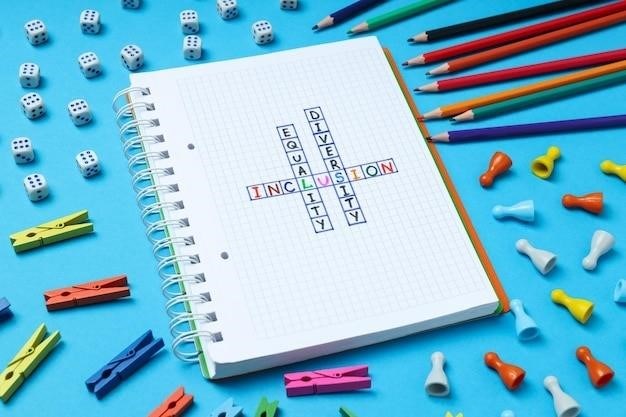Understanding Dyscalculia
What is Dyscalculia?
Dyscalculia‚ a neurological disorder‚ significantly impacts an individual’s ability to understand and perform mathematical tasks. It affects number sense‚ calculations‚ and problem-solving skills‚ impacting daily life and academic pursuits.
Symptoms vary‚ but may include difficulty with number recognition‚ memorizing math facts‚ and understanding spatial relationships. Diagnosis often involves comprehensive assessments by educational psychologists or specialists. Early identification is crucial.
Adults with dyscalculia may face challenges in managing finances‚ understanding data‚ or performing tasks requiring numerical comprehension. Support and accommodations can significantly improve their abilities and quality of life.
What is Dyscalculia?
Dyscalculia is a specific learning difficulty that affects the ability to acquire and process numerical information. It’s a neurological condition impacting mathematical skills‚ not a result of lack of intelligence or effort; Individuals with dyscalculia may struggle with various aspects of math‚ including basic number sense‚ understanding mathematical concepts‚ performing calculations‚ and applying mathematical knowledge to real-world problems. The challenges are not limited to arithmetic; they can extend to tasks involving time‚ measurement‚ and spatial reasoning. Unlike general math difficulties‚ dyscalculia represents a persistent and specific impairment in mathematical processing. This learning difficulty can manifest in different ways and to varying degrees of severity‚ making it crucial to understand its diverse presentations. Early identification and appropriate support are essential for helping individuals with dyscalculia overcome their challenges and achieve their full potential. A multi-sensory approach often proves beneficial in learning math concepts.
Dyscalculia Symptoms and Diagnosis
Recognizing dyscalculia requires careful observation of persistent difficulties in mathematical areas. Common symptoms include trouble understanding number concepts‚ memorizing basic math facts (like multiplication tables)‚ and performing calculations accurately. Spatial reasoning challenges‚ such as difficulty understanding maps or telling time‚ are also frequently observed. Children might struggle with sequencing‚ pattern recognition‚ and estimation. Adults may experience problems managing finances‚ interpreting graphs‚ or working with measurements. Diagnosis is not a simple process and typically involves a multi-faceted approach. Educational psychologists or specialists conduct comprehensive assessments‚ observing performance on various mathematical tasks and analyzing their approach to problem-solving. The assessment considers the individual’s developmental stage and learning history. There is no single test to diagnose dyscalculia; rather‚ it’s a clinical judgment based on a pattern of difficulties across several mathematical domains. Early intervention is key to providing effective support.
Dyscalculia in Adults
The challenges posed by dyscalculia often persist into adulthood‚ significantly impacting various aspects of daily life. Adults with dyscalculia may struggle with tasks requiring numerical reasoning‚ such as managing finances‚ budgeting‚ or calculating tips. Difficulty with time management‚ understanding schedules‚ or interpreting data presented in graphs or charts is also common. Challenges in spatial reasoning can affect navigation or assembling furniture. While these difficulties can be frustrating and lead to feelings of inadequacy‚ it’s crucial to remember that dyscalculia is not a reflection of intelligence or ability. Many adults with dyscalculia develop effective coping strategies and compensatory techniques to manage their challenges. These strategies may include using calculators‚ relying on visual aids‚ or breaking down complex tasks into smaller‚ more manageable steps. Seeking support from professionals such as occupational therapists or learning specialists can provide valuable guidance and personalized strategies for managing dyscalculia in adulthood. Moreover‚ understanding the condition and its impact can help adults advocate for themselves and access appropriate accommodations in the workplace or other settings.

Resources for Dyscalculia
Several websites offer free downloadable resources‚ including fact sheets‚ guides‚ and worksheets designed to help individuals understand and manage dyscalculia.
Free PDF Resources and Downloads
The internet offers a wealth of free downloadable resources for individuals seeking to understand and support those with dyscalculia. These resources are invaluable for parents‚ educators‚ and individuals themselves. Look for comprehensive guides offering practical strategies and techniques for improving mathematical skills. Many websites provide fact sheets summarizing key information about dyscalculia‚ its symptoms‚ and effective intervention methods. These can serve as excellent starting points for learning about the condition. You may also find printable worksheets designed to help practice specific mathematical concepts and skills‚ tailored to the needs of individuals with dyscalculia. Remember to look for resources that use multi-sensory approaches‚ incorporating visual aids and hands-on activities. The key is to find engaging and accessible materials that cater to different learning styles and needs. These free resources are an excellent way to start building a foundation of knowledge and practical tools for supporting someone with dyscalculia. Always check the credentials and reputation of the source to ensure the information is accurate and reliable. Remember to supplement these digital resources with support from professionals.
Online Resources and Websites
Numerous websites offer valuable information and support for dyscalculia. These online platforms provide a wealth of resources‚ often exceeding what’s available in print. Many organizations dedicated to learning disabilities feature sections specifically addressing dyscalculia‚ offering detailed explanations‚ diagnostic criteria‚ and practical strategies. Educational websites often include interactive tools and games designed to help individuals with dyscalculia develop essential mathematical skills. These engaging activities can make learning more accessible and enjoyable. Blogs and forums created by parents‚ educators‚ and individuals with dyscalculia offer personal perspectives and shared experiences. These platforms provide a supportive community where individuals can connect‚ share insights‚ and find encouragement. Online communities offer a place to ask questions‚ seek advice‚ and learn from others navigating similar challenges. Remember to critically evaluate the credibility of online sources‚ ensuring that the information aligns with established research and professional guidelines. This will help you find reliable and helpful information online.
Podcasts and Webinars on Dyscalculia
Podcasts and webinars offer convenient and accessible ways to learn about dyscalculia. Many educational podcasts feature interviews with experts‚ researchers‚ and individuals with dyscalculia‚ sharing insights and experiences. These audio programs allow listeners to learn while multitasking‚ making them ideal for busy individuals. Webinars often provide interactive sessions with opportunities to ask questions and engage with presenters. These online seminars frequently cover practical strategies for teaching and supporting individuals with dyscalculia‚ offering valuable advice for educators and parents. Some webinars may provide downloadable resources‚ such as worksheets or guides‚ to enhance the learning experience. Look for webinars hosted by reputable organizations in the field of special education or learning disabilities. These resources can provide up-to-date information and evidence-based approaches to understanding and addressing dyscalculia. Check regularly for upcoming webinars and podcasts‚ as new content is frequently added. The convenience and diverse formats of podcasts and webinars make them valuable tools for expanding your knowledge of dyscalculia.

Supporting Individuals with Dyscalculia
Multi-sensory approaches‚ using manipulatives and visual aids‚ prove highly effective in teaching math concepts to individuals with dyscalculia. Breaking down complex problems into smaller‚ manageable steps also aids comprehension.
Effective Teaching Strategies
For students with dyscalculia‚ effective teaching strategies move beyond traditional rote learning. Instead‚ they emphasize a multi-sensory approach‚ engaging various learning styles simultaneously. This might involve using manipulatives like blocks or counters to represent numbers and operations‚ making abstract concepts more concrete and easier to grasp. Visual aids‚ such as number lines‚ charts‚ and diagrams‚ provide visual representations that support understanding. Similarly‚ incorporating technology like interactive math software or apps can offer engaging and adaptable learning experiences. These tools allow for personalized pacing and repeated practice‚ crucial for mastering fundamental math skills. Breaking down complex problems into smaller‚ more manageable steps is also key. This prevents students from feeling overwhelmed and allows them to focus on individual components before synthesizing the whole. Regular and consistent practice‚ with a focus on understanding rather than memorization‚ is vital for building a strong foundation in math. Patience‚ positive reinforcement‚ and a supportive learning environment are essential for fostering confidence and encouraging perseverance in students with dyscalculia.
Classroom Adjustments and Accommodations
Creating an inclusive classroom environment for students with dyscalculia requires thoughtful adjustments and accommodations. These may involve providing extra time for completing assignments and tests‚ recognizing that processing numerical information takes longer for these students. Allowing the use of calculators or other assistive technology can significantly reduce the burden of calculation‚ enabling students to focus on problem-solving strategies. Presenting information in multiple formats—visual‚ auditory‚ and kinesthetic—ensures that students can access the material through their preferred learning style. Clear and concise instructions‚ broken down into smaller steps‚ minimize confusion and improve comprehension. The use of graphic organizers or visual aids can help students organize their thoughts and approach problems systematically. Furthermore‚ providing opportunities for hands-on activities and manipulatives allows for a more concrete understanding of mathematical concepts. Regular check-ins and individualized support from the teacher are essential for monitoring progress and providing timely interventions. A collaborative approach‚ involving parents and specialists‚ ensures a comprehensive and supportive learning experience for the student.
Tools and Technologies for Support
Numerous tools and technologies can significantly aid students with dyscalculia. Calculators‚ while seemingly simple‚ are invaluable for reducing the computational burden‚ allowing focus on problem-solving. Specialized software programs offer interactive exercises and games designed to strengthen number sense and mathematical skills. These programs often provide adaptive feedback‚ adjusting the difficulty level based on the student’s performance. Online resources and educational websites offer a wealth of engaging activities and practice problems‚ catering to various learning styles and preferences. Graphic organizers‚ available in both digital and print formats‚ help students visually structure their thinking and approach problem-solving more strategically. Assistive technology‚ such as screen readers and text-to-speech software‚ can aid in accessing and understanding mathematical information presented in digital formats. Moreover‚ apps designed for mathematical learning offer interactive practice and support‚ often incorporating multi-sensory approaches to enhance engagement and understanding. The selection of appropriate tools and technologies should be individualized‚ considering the student’s specific needs and learning preferences‚ ensuring maximum effectiveness.
Further Research and Information
Seeking additional information on dyscalculia? Explore research studies‚ insightful books‚ and reputable organizations offering support and resources for individuals‚ educators‚ and families impacted by this learning difference.
Research Studies on Dyscalculia
Numerous research studies illuminate the multifaceted nature of dyscalculia. Neuroimaging studies‚ for example‚ often reveal structural and functional differences in brain regions associated with numerical processing in individuals with dyscalculia compared to their neurotypical peers. These studies help researchers understand the neurological underpinnings of the condition. Furthermore‚ longitudinal studies track the development of mathematical skills in children with dyscalculia‚ shedding light on the trajectory of the disorder and the effectiveness of various interventions. Research also investigates the genetic and environmental factors that may contribute to the risk of developing dyscalculia. These studies often involve twin studies or family-based genetic analyses‚ aiming to identify specific genes or gene combinations associated with an increased likelihood of dyscalculia. Understanding the interplay between genetic predisposition and environmental influences is crucial for developing effective preventative measures and interventions. Finally‚ studies on the efficacy of different educational interventions for dyscalculia are essential. These studies rigorously evaluate the impact of various teaching methods‚ technologies‚ and therapeutic approaches on improving mathematical skills and academic outcomes in individuals with dyscalculia. The findings from these studies guide the development of evidence-based interventions and inform best practices in education and therapy.
Books and Articles on Dyscalculia
A wealth of resources exists to deepen understanding of dyscalculia. Many books offer comprehensive overviews of the condition‚ covering its definition‚ diagnosis‚ and effective interventions. These resources often provide practical strategies for parents‚ educators‚ and therapists working with individuals affected by dyscalculia. Some books focus specifically on teaching methods‚ offering detailed lesson plans and activities designed to address the unique learning needs of students with dyscalculia. Others delve into the neurological aspects of the disorder‚ exploring the brain regions and cognitive processes involved in mathematical learning. In addition to books‚ numerous peer-reviewed articles provide in-depth research findings on dyscalculia. These articles often report on specific studies investigating the effectiveness of interventions‚ the genetic basis of dyscalculia‚ or the relationship between dyscalculia and other learning disabilities. Many journals dedicated to education‚ psychology‚ and neuroscience publish research on dyscalculia regularly. Access to these scholarly publications allows professionals to stay abreast of the latest research and best practices. Furthermore‚ accessible articles written for a broader audience can empower parents and educators to better understand and support individuals with dyscalculia. These articles often translate complex research findings into practical advice and strategies for everyday life.
Organizations and Support Groups
Connecting with organizations and support groups dedicated to dyscalculia offers invaluable resources and a sense of community for individuals‚ families‚ and educators. These groups provide a platform for sharing experiences‚ accessing practical advice‚ and learning about the latest research and interventions. Many organizations offer workshops‚ conferences‚ and online forums where individuals can connect with others facing similar challenges. Support groups often provide a safe and supportive environment for individuals to discuss their struggles and celebrate their successes. These groups can be particularly beneficial for parents and caregivers seeking guidance and emotional support. Additionally‚ several organizations advocate for increased awareness of dyscalculia and work to improve educational policies and practices. They may offer training programs for educators and provide resources for schools to support students with dyscalculia effectively. Some organizations maintain extensive websites with information on dyscalculia‚ including fact sheets‚ articles‚ and links to relevant research. These websites often serve as a valuable resource for finding local support groups and connecting with professionals specializing in dyscalculia.
